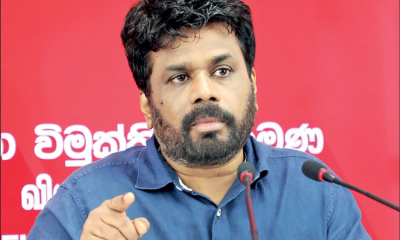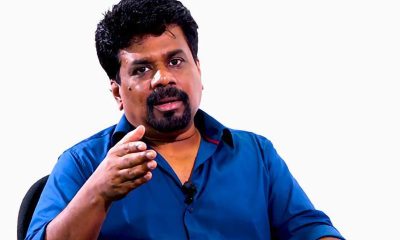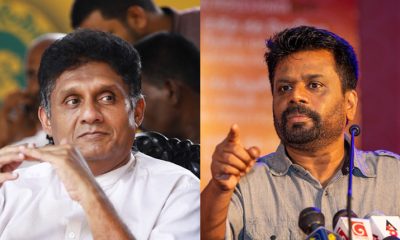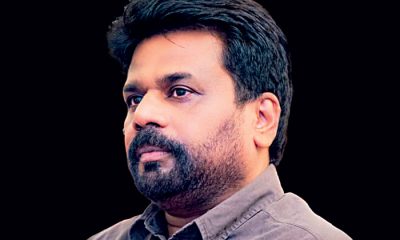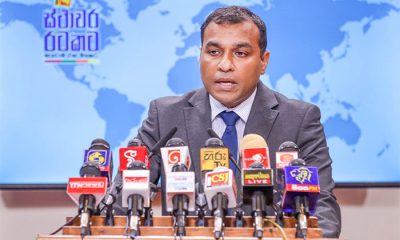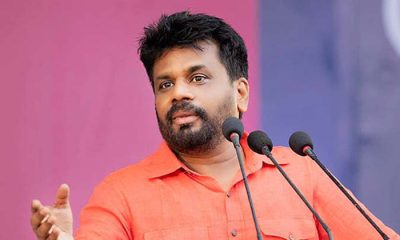Midweek Review
Govt. responds in kind to Thuyacontha’s salvo
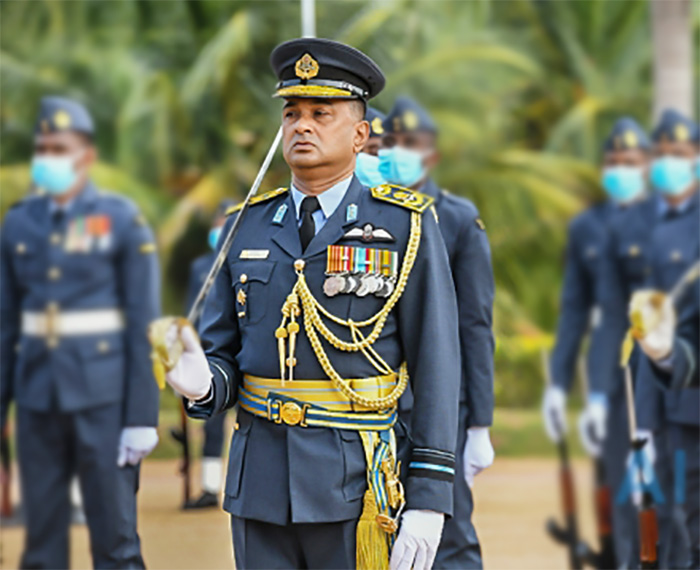
At the behest of the then late President Ranasinghe Premadasa way back in 1989, the then Election Commission recognised the PFLT (People’s Front of Liberation Tigers) as the political arm of the LTTE. The late Gopalswamy Mahendraraja aka Mahattaya, the LTTE Deputy Leader was its founding leader (He was executed in Dec 1994 on the orders of LTTE leader Velupillai Prabhakaran after being in captivity for 16 months). The then government was ready to give the LTTE an opportunity to contest elections.
By then all other Indian trained Sri Lankan terrorist groups had entered mainstream politics. Fisheries Minister Douglas Devananda (EPDP leader) is just one of them.
The UNP brought him to politics. In fact, the UNP brought several other ex-Tamil terrorist groups, including the PLOTE into mainstream politics. The PLOTE received international attention when it mounted an abortive bid to seize control of the Maldives in early Nov 1988. It too, is represented in parliament today.
The parliament during Mahinda Rajapaksa’s tenure had no qualms in accepting LTTE battlefield commander Karuna Amman responsible for the deaths of thousands of soldiers. Karuna also received a top position in the SLFP while his associate another ex-terrorist Pilleyan serves as a Deputy Minister now.
The JVP itself was allowed to re-enter mainstream politics regardless of its murderous past. Therefore, why consider a retired AVM a threat to national security?
The issue at hand is that those who governed this country in the past three decades had caused so much destruction, they fear the emergence of a political power other than them.
That is the crux of the matter.
By Shamindra Ferdinando
On behalf of the Wickremesinghe-Rajapaksa government, State Defence Minister Premitha Bandara Tennakoon last Friday (24) reacted to accusations over the blacklisting of retired Air Vice Marshal Sampath Thuyacontha.
The Matale District MP declared that Air Force headquarters had no other option but to resort to legitimate counter measures against the threat posed by AVM Thuyacontha.
The officer concerned also served as Sri Lanka’s Defence Attaché in Islamabad after the successful conclusion of the war in May 2009, retired in Nov 2021. His retirement took place a few months before public protests erupted against the then President Gotabaya Rajapaksa over disruption of essential supplies consequent to an unprecedented debt and balance of payment crises.
The former Lieutenant Col. Rajapaksa was caught up in the crisis that had been caused by mismanagement of the economy over the years and especially during the tenures of President Chandrika Bandaranaike Kumaratunga (1994-2005) and she left office leaving a negative growth rate, Mahinda Rajapaksa (2005-2015) and Maithripala Sirisena (2015-2019). However, during the Yahapalana administration the finances were under the UNP control.
Gotabaya Rajapaksa contributed to the calamity by slashing taxes, including VAT with the idea of encouraging growth, but at the worst possible time in the aftermath of debilitating suicide attacks by terrorists on Easter Sunday 2019 and the onset of the COVID pandemic, stubbornly failing to seek IMF help with clear signs of economic trouble and ruination of the agriculture sector by his hasty decision to ban the import of chemical fertiliser and other agro chemicals. The 2019 Easter Sunday carnage debilitated the vital tourism sector and covid-19 pandemic caused further deterioration. However, to be fair to President Mahinda Rajapaksa he achieved much during his tenure. In addition to winning the 30-year war, which many pundits said was something our security forces were incapable of achieving, he successfully embarked on a series of massive development projects with Chinese assistance, including building expressways as never before, an international airport, etc., while fighting the costly war to a finish.
Tennakoon, the youngest ever to serve as the State Defence Minister found fault with the SLAF veteran for causing dissent among the SLAF. The State Defence Minister is an SLPP Matale District MP and one-time minister Janaka Bandara Tennakoon’s son.
Premitha Bandara Tennakoon received ministerial appointment from President Ranil Wickremesinghe on Sept. 08, 2022.
The bone of contention is a fiery speech the AVM delivered on March 05 in Gampaha. Referring to the debarred SLAF officer’s previous speeches, the State Minister declared the Gampaha speech was not acceptable at all.
The State Minister discussed how the retired officer’s actions were in line with the overall JVP-led Jathika Jana Balavegaya (JJB) political strategy that could cause further turmoil in the country by inciting hatred on the government.
MP Tennakoon dealt with the issue at hand against the backdrop of the overthrowing of President Gotabaya Rajapaksa following unprecedented mob violence, which were painted as peaceful protests by interested parties.
The State Minister in particular pointed to the culpability on the part of the JVP in inciting the public against the then government and security forces. The State Minister was responding to JVP leader Anura Kumara Dissanayake, who raised the issue at hand. Let me leave the JVPer’s rhetoric and just concentrate on the primary issue. The Colombo District MP essentially asked whether ex-military personnel could engage in politics only if they aligned with the incumbent government or those acceptable to the regime.
The JVPer also questioned restrictions imposed on Maj. Gen. Aruna Jayasekera, who led the group of ex-military personnel affiliated to the JJB.
Lawmaker Dissanayake challenged the government over the degrading treatment of a retired senior officer while comparing the latest development with the high profile role played by Defence Secretary Kamal Gunaratne in the run-up to the 2019 presidential election and war winning Army Commander Field Marshal Sarath Fonseka’s role.
Obviously that is the bone of contention. A decorated pilot, who commanded the celebrated No 09 Attack Helicopter Squadron, Thuyacontha is the senior most retired SLAF officer to declare his support directly to the JVP. The move may have caused alarm among the top government leadership as well as the intelligence community in light of the fact the JVP had been responsible for two abortive violent rebellions in the country and both of which had to be crushed by the elected governments then in power after much bloodletting. That is an undeniable fact. Directorate of Provost, SLAF, in a confidential missive, dated March 10, 2023, addressed to all stations blacklisted four personnel (three retired, including Thuyacontha and one discharged). In addition to the renowned pilot, the other blacklisted were Warrant Officer R.H.A. Indika, Sergeant H.A.U.A. Premaratne and Corporal W.A.P.C. Perera. The JJB has vowed to move the Supreme Court against the government move.
Unfortunately, the issue erupted during a UN inspection of the Sri Lankan Army’s capacity to enhance its deployment in Mali, a landlocked country in West Africa.
Restrictions imposed on war winning Sri Lankan military leadership by the UN as well as individual countries such as travel ban on General Shavendra Silva should be examined alongside the other contentious matters. Foreign Minister Ali Sabry, PC, is on record as having said (in response to a query raised by the writer at a Foreign Ministry media briefing) that entire fighting divisions had been targeted by the international community, meaning the Western camp led by the US.
Nalin Siriwardhana formerly of the Navy in a Facebook post strongly backed measures taken against AVM Thuyacontha on the basis that those serving and retired officers engaged in politics for their personal benefit.
Australia-based dual citizen Siriwardhana without hesitation declared that the likes of AVM Thuyacontha should engage in politics without wasting time in a bid to deceive the public. One-time Sri Lanka Telecom employee emphasised that the officer concerned couldn’t have been unaware that such disciplinary measures were routine in the case of those retirees who engage in politics.
Siriwardhana stressed that as there couldn’t be any exceptions, the AVM shouldn’t expect special treatment under any circumstances. The Commander-in-Chief, in this instance, President Ranil Wickremesinghe who also holds defence portfolio enjoys the right to appropriately respond to such unacceptable conduct on the part of retired officers and men.
Retired Lieutenant Siriwardhana figured in a previous Midweek piece (A forgotten episode: Black Sea Tiger raid on Colombo port, published on Oct 12, 2022 /https://island.lk/a-forgotten-episode-black-sea-tiger-raid-on-colombo-port/).
The former Navy officer’s stand should be carefully examined taking into consideration the duplicitous response of successive governments to military men dabbling in politics. That was the issue raised by the JVP leader in Parliament. Before that let me briefly discuss Thuyacontha’s contribution to defeat the LTTE.
A daring pilot
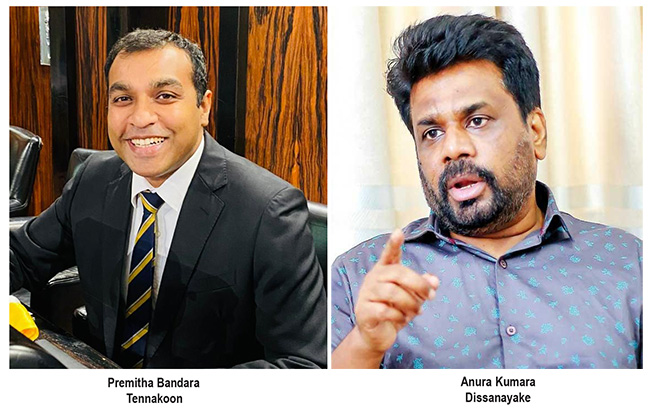 The Aerial Tribute: The Role of Air Power in Defeating Terrorism in Sri Lanka authored by Dr. Nirosha Mendis at the request of Air Marshal H.D. Abeywickrama
The Aerial Tribute: The Role of Air Power in Defeating Terrorism in Sri Lanka authored by Dr. Nirosha Mendis at the request of Air Marshal H.D. Abeywickrama
(Feb 27, 2011-Feb 27, 2014). Without doubt, Dr. Mendis’s work is the only available complete account of SLAF’s role in the war with excellent analysis of the role played by different formations and units. The author skillfully dealt with the No 09 Attack Helicopter Squadron and the overall impact the daring unit had on the war.
One of the most thought-provoking brief episodes mentioned therein is serious battle damage suffered by Mi-24 helicopter gunship piloted by the then Wing Commander Thuyacontha, the daring Commanding Officer of the No 09 Squadron, headquartered at Hingurakgoda. This was during Close-Air-Support (CAS) mission over the LTTE stronghold of Mulliyaweli, Mullaitivu during the final phase of the offensive action.
Thuyacontha’s fighting machine was hit 32 times during that battle, one of the fiercest during the Eelam War IV. On the paqrticular day the daredevil CO of the No 09 Squadron flew on the mission from China Bay, Trincomalee and found it difficult to return to the base due to heavy battle damage. Thuyacontha told The Island: “We were short of rockets, therefore Mi-24s couldn’t engage targets from somewhat a safe distance but move closer to engage targets with guns.”
Having received the command of the elite Squadron in 2005, the year before the Eelam War IV erupted with simultaneous LTTE offensives in the North and East, Thuyacontha relinquished command in Sept 2009.
Ex-military role in GR’s strategy
During yahapalana dispensation (2015-2019), ex-military officers openly campaigned for Gotabaya Rajapaksa. Initially, the wartime Defence Secretary didn’t have the anticipated support from some sections of his own family as well as the SLPP but gradually he turned around the situation. Retired officers played a significant role in the overall campaign, but to varying degrees. The writer wouldn’t under any circumstances deny backing the high profile campaign from the very beginning. The yahapalana government never tried to dissuade ex-military personnel from campaigning for Gotabaya Rajapaksa.
Maj. Gen. G.A. Chandrasiri and Rear Admiral Mohan Wijewickrema went a step further by launching a book titled ‘Conflict and Stability’ in support of Gotabaya Rajapaksa. The book launch organised by Gotabaya Rajapaksa’s brainchild Viyathmaga was held in Nov 2016. One-time Northern Province Governor Chandrasiri received the appointment as Chairman, Airport and Aviation Services on Dec 18, 2019. Among those present on that occasion were Vice Admiral Mohan
Wijewickrema, Air Chief Marshal Roshan Goonetileke and Anura Fernando (Later received appointment as Sri Lanka’s Counsel General in Shanghai, China).
Wijewickrema assumed duties on June 12, 2020 as Sri Lanka’s High Commissioner in Pakistan whereas Roshan Gunatileke received appointment as Governor, Western Province on March 24, 2020.
Retired Maj. Gen. Kamal Gunaratne, who made a valuable contribution to Gotabaya Rajapaksa’s campaign, received appointment as Secretary to the Ministry of Defence on Nov 19, 2019.
The author of Road to Nanthikadal spearheaded the propaganda campaign with appearances on television as well. Gunaratne, the former General Officer
Commanding (GoC) of 53 Division was re-appointed Defence Secretary by President Ranil Wickremesinghe.
Former Army Chief of Staff Nanda Mallawarachchi, too, received an appointment from President Gotabaya Rajapaksa while ex-Army Chief Daya Ratnayake was appointed Chairman Ports Authority (SLPA). Post-war commander Ratnayake was unceremoniously removed from that post in June 2021.
Former Navy Commander Admiral Jayanath Colombage received appointment as Secretary to the Ministry of Foreign Affairs in August 2020. Currently, the post-war Navy Commander is Sri Lanka’s Ambassador in Indonesia, while retired SLAF Commander Air Marshal Sumangala Dias serves as Sri Lanka’s top envoy in Malaysia.
It wouldn’t be realistic to list all ex-military personnel who received government appointments both here and overseas.
After Sri Lanka’s triumph over LTTE terrorism in May 2009, the then Mahinda Rajapaksa government opened the doors for more-ex military personnel to enter politics. The government brazenly exploited the situation to its advantage. The UNP-led Opposition, too, likewise, brought in the then General Fonseka into the political ring in late 2009. Fonseka received the backing of a coalition that included both the JVP and the TNA, despite it having recognised the LTTE as the sole representative of Tamil speaking people way back in 2001 and then having blamed Fonseka and his war winning army of committing war crimes after the crushing defeat of the Tigers.
The UNP led move received the blessings of the US. Thanks to revelations made by the Wikileaks, the direct US involvement in the project that brought forward Fonseka as the common presidential candidate cannot be denied.
The US intervened on behalf of Fonseka after he was incarcerated. Sustained US pressure contributed to Fonseka’s subsequent release but he couldn’t come to terms with the UNP subsequently though he received their support at the 2010 presidential poll.
Washington well-known for playing Dr. Jakyl and Mr. Hyde roles world over to maintain its world hegemony, it would be interesting to know the US reaction to the Thuyacontha affair, particularly against the backdrop of perceived US readiness to work with the JVP too. US Ambassador Julie Chung paid a rather unusual courtesy call on JVP leader Dissanayake, MP, and Vijitha Herath, MP, at their Bataramulla headquarters on May 14, 2022. That visit was made at a time when President Gotabaya Rajapaksa was struggling to regain control of the rapidly deteriorating situation. The US Ambassador had no qualms in meeting JVP leaders in spite of accusations the party influenced the campaign directed against the President Gotabaya Rajapaksa, the military and the ruling party.
State Defence Minister Tennakoon didn’t mince his words when he questioned the JVP’s role in May’s gory violence in the aftermath of a SLPP goon attack launched from Temple Trees on protesters outside it and at Galle Face.
Recent declaration made by Tourism Minister Harin Fernando in Badulla that UNP leader Ranil Wickremesinghe spearheaded the campaign at the Presidential Secretariat (old parliament), too, cannot be ignored.
President Wickremesinghe has lambasted Frontline Socialist Party (FSP) for being responsible for violence, a charge vehemently denied by the breakaway JVP faction.
Wickremesinghe went to the extent of naming FSP General Secretary Kumar Gunaratnam as the mastermind in the violent political project.
JJB makes headway
AVM Thuyacontha’s unexpected move received quite a significant public response. The government and the main Opposition still appeared to have failed to comprehend why the public appears to be increasingly appreciative of the JJB. Actually, the JJB with just three MPs including one National List MP in the current parliament is politically insignificant in terms of parliamentary strength. Having ruined the economy over the past several decades leading to declaration of bankruptcy early last year, the major political parties should accept responsibility for creating a perfect environment for the JJB. The JVP/JJB had never been attractive to the military or ex-military though perhaps just an insignificant number of officers and men may have sympathized with their cause.
AVM Thuyacontha or Maj. Gen. Jayasekera wouldn’t probably at least considered voting for the JVP/JJB if not for the ruination caused by major political parties.
Instead of taking remedial measures, at least now, the government has decided to confront the perceived threat from the growing opposition.
The composition of parliament possibly doesn’t reflect the present public sentiment at all. The unceremonious exit of Gotabaya Rajapaksa in last July may have proved that the electorate no longer respected the two mandates received by the ruling SLPP at Nov 2019 presidential and August 2020 parliamentary elections. But the question is whether the entire ouster was instigated and executed from scratch by the West with the help of local quislings as has happened in so many other countries where they have successfully instigated regime changes or attempted them from Chile to Bolivia, Iran, Libya, Syria etc, etc. And they have the audacity to threaten regime change even in Russia!
In spite of incumbent President Ranil Wickremesinghe being legitimately elected by parliament in last July, discontent among the electorate is growing as claimed by the opposition. A major propaganda effort to depict the finalisation of the USD 2.9 bn and the immediate availability of USD 333 mn as a massive victory for the government went awry when State Finance Minister Ranjith Siyambalapitiya admitted that within 24 hours USD 121 mn was paid to India. The government seems to be trapped in its own propaganda and being silly.
Those who are rattled by the JVP/JJB drawing support of the ex-military should pressure the government and the main Opposition to address issues at hand. The only way to thwart the JVP/JJB is to take tangible measures to drastically curb waste, corruption, irregularities and mismanagement. If they bother to peruse proceedings of
Parliamentary watchdog committees, COPE, COPA and COPF, action could be initiated to reverse the situation. Unfortunately, the government and the main Opposition seemed to be driving more people to the JVP/JJB by giving corruption a free hand.
Midweek Review
Year ends with the NPP govt. on the back foot

The failure on the part of the Janatha Vimukthi Peramuna (JVP)-led National People’s Power (NPP) government to fulfil a plethora of promises given in the run up to the last presidential election, in September, 2024, and a series of incidents, including cases of corruption, and embarrassing failure to act on a specific weather alert, ahead of Cyclone Ditwah, had undermined the administration beyond measure.
Ditwah dealt a knockout blow to the arrogant and cocky NPP. If the ruling party consented to the Opposition proposal for a Parliamentary Select Committee (PSC) to probe the events leading to the November 27 cyclone, the disclosure would be catastrophic, even for the all-powerful Executive President Anura Kumara Dissanayake, as responsible government bodies, like the Disaster Management Centre that horribly failed in its duty, and the Met Department that alerted about the developing storm, but the government did not heed its timely warnings, directly come under his purview.
The NPP is on the back foot and struggling to cope up with the rapidly developing situation. In spite of having both executive presidency and an overwhelming 2/3 majority in Parliament, the government seems to be weak and in total disarray.
The regular appearance of President Dissanayake in Parliament, who usually respond deftly to criticism, thereby defending his parliamentary group, obviously failed to make an impression. Overall, the top NPP leadership appeared to have caused irreparable damage to the NPP and taken the shine out of two glorious electoral victories at the last presidential and parliamentary polls held in September and November 2024 respectively.
The NPP has deteriorated, both in and out of Parliament. The performance of the 159-member NPP parliamentary group, led by Prime Minister Dr. Harini Amarasuriya, doesn’t reflect the actual situation on the ground or the developing political environment.
Having repeatedly boasted of its commitment to bring about good governance and accountability, the current dispensation proved in style that it is definitely not different from the previous lots or even worse. (The recent arrest of a policeman who claimed of being assaulted by a gang, led by an NPP MP, emphasised that so-called system change is nothing but a farce) In the run-up to the November, 2024, parliamentary polls, President Dissanayake, who is the leader of both the JVP and NPP, declared that the House should be filled with only NPPers as other political parties were corrupt. Dissanayake cited the Parliament defeating the no-confidence motions filed against Ravi Karunanayake (2016/over Treasury Bond scams) and Keheliya Rambukwella (2023/against health sector corruption) to promote his argument. However, recently the ongoing controversy over patient deaths, allegedly blamed on the administration of Ondansetron injections, exposed the government.
Mounting concerns over drug safety and regulatory oversight triggered strong calls from medical professionals, and trade unions, for the resignation of senior officials at the National Medicines Regulatory Authority (NMRA) and the State Pharmaceutical Corporation (SPC).
Medical and civil rights groups declared that the incident exposed deep systemic failures in Sri Lanka’s drug regulatory framework, with critics warning that the collapse of quality assurance mechanisms is placing patients’ lives at grave risk.
The Medical and Civil Rights Professional Association of Doctors (MCRPA), and allied trade unions, accused health authorities of gross negligence and demanded the immediate resignation of senior NMRA and SPC officials.
MCRPA President Dr. Chamal Sanjeewa is on record as having said that the Health Ministry, NMRA and SPC had collectively failed to ensure patient safety, citing, what he described as, a failed drug regulatory system.
The controversy has taken an unexpected turn with some alleging that the NPP government, on behalf of Sri Lanka and India, in April this year, entered into an agreement whereby the former agreed to lower quality/standards of medicine imports.
Trouble begins with Ranwala’s resignation
The NPP suffered a humiliating setback when its National List MP Asoka Ranwala had to resign from the post of Speaker on 13 December, 2024, following intense controversy over his educational qualification. The petroleum sector trade union leader served as the Speaker for a period of three weeks and his resignation shook the party. Ranwala, first time entrant to Parliament was one of the 18 NPP National List appointees out of a total of 29. The Parliament consists of 196 elected and 29 appointed members. Since the introduction of the National List, in 1989, there had never been an occasion where one party secured 18 slots.
The JVP/NPP made an initial bid to defend Ranwala but quickly gave it up and got him to resign amidst media furor. Ranwala dominated the social media as political rivals exploited the controversy over his claimed doctorate from the Waseda University of Japan, which he has failed to prove to this day. But, the JVP/NPP had to suffer a second time as a result of Ranwala’s antics when he caused injuries to three persons, including a child, on 11 December, in the Sapugaskanda police area.
The NPP made a pathetic, UNP and SLFP style effort to save the parliamentarian by blaming the Sapugaskanda police for not promptly subjecting him for a drunk driving test. The declaration made by the Government Analyst Department that the parliamentarian hadn’t been drunk at the time of the accident, several days after the accident, does not make any difference. Having experienced the wrongdoing of successive previous governments, the public, regardless of what various interested parties propagated on social media, realise that the government is making a disgraceful bid to cover-up.
No less a person than President Dissanayake is on record as having said that their members do not consume liquor. Let us wait for the outcome of the internal investigation into the lapses on the part of the Sapugaskanda police with regard to the accident that happened near Denimulla Junction, in Sapugaskanda.
JVP/NPP bigwigs obviously hadn’t learnt from the Weligama W 15 hotel attack in December, 2023, that ruined President Ranil Wickremeinghe’s administration. That incident exposed the direct nexus between the government and the police in carrying out Mafia-style operations. Although the two incidents cannot be compared as the circumstances differ, there is a similarity. Initially, police headquarters represented the interests of the wrongdoers, while President Wickremesinghe bent over backwards to retain the man who dispatched the CCD (Colombo Crime Division) team to Weligama, as the IGP. The UNP leader went to the extent of speaking to Chief Justice Jayantha Jayasuriya, PC, and Speaker Mahinda Yapa Abeywardena to push his agenda. There is no dispute the then Public Security Minister Tiran Alles wanted Deshabandu Tennakoon as IGP, regardless of a spate of accusations against him, in addition to him being faulted by the Supreme Court in a high-profile fundamental rights application.
The JVP/NPP must have realised that though the Opposition remained disorganised and ineffective, thanks to the media, particularly social media, a case of transgression, if not addressed swiftly and properly, can develop into a crisis. Action taken by the government to protect Ranwala is a case in point. Government leaders must have heaved a sigh of relief as Ranwala is no longer the Speaker when he drove a jeep recklessly and collided with a motorcycle and a car.
Major cases, key developments
Instead of addressing public concerns, the government sought to suppress the truth by manipulating and exploiting developments
* The release of 323 containers from the Colombo Port, in January 2025, is a case in point. The issue at hand is whether the powers that be took advantage of the port congestion to clear ‘red-flagged’ containers.
Although the Customs repeatedly declared that they did nothing wrong and such releases were resorted even during Ranil Wickremesinghe’s presidency (July 2022 to September 2024), the public won’t buy that. Container issue remains a mystery. That controversy eroded public confidence in the NPP that vowed 100 percent transparency in all its dealings. But the way the current dispensation handled the Port congestion proved that transparency must be the last thing in the minds of the JVPers/NPPers holding office.
* The JVP/NPP’s much touted all-out anti-corruption stand suffered a debilitating blow over their failure to finalise the appointment of a new Auditor General. In spite of the Opposition, the civil society, and the media, vigorously taking up this issue, the government continued to hold up the appointment by irresponsibly pushing for an appointment acceptable to President Dissanayake. The JVP/NPP is certainly pursuing a strategy contrary to what it preached while in the Opposition and found fault with successive governments for trying to manipulate the AG. It would be pertinent to mention that President Dissanayake should accept the responsibility for the inordinate delay in proposing a suitable person to that position. The government failed to get the approval of the Constitutional Council more than once to install a favourite of theirs in it, thanks to the forthright position taken by its civil society representatives.
The government should be ashamed of its disgraceful effort to bring the Office of the Auditor General under its thumb:
* The JVP/NPP government’s hotly disputed decision to procure 1,775 brand-new double cab pickup trucks, at a staggering cost exceeding Rs. 12,500 mn, under controversial circumstances, exposed the duplicity of that party that painted all other political parties black. Would the government rethink the double cab deal, especially in the wake of economic ruination caused by Cyclone Ditwah? The top leadership seems to be determined to proceed with their original plans, regardless of immeasurable losses caused by Cyclone Ditwah. Post-cyclone efforts still remain at a nascent stage with the government putting on a brave face. The top leadership has turned a blind eye to the overwhelming challenge in getting the country back on track especially against the backdrop of its agreement with the IMF.
Post-Cyclone Ditwah recovery process is going to be slow and extremely painful. Unfortunately, both the government and the Opposition are hell-bent on exploiting the miserable conditions experienced by its hapless victims. The government is yet to acknowledge that it could have faced the crisis much better if it acted on the warning issued by Met Department Chief Athula Karunanayake on 12 November, two weeks before the cyclone struck.
Foreign policy dilemma
Sri Lanka moved further closer to India and the US this year as President Dissanayake entered into several new agreements with them. In spite of criticism, seven Memorandums of Understanding (MoUs), including one on defence, remains confidential. What are they hiding?
Within weeks after signing of the seven MoUs, India bought the controlling interests in the Colombo Dockyard Limited for USD 52 mn.
Although some Opposition members, representing the SJB, raised the issue, their leader Sajith Premadasa, during a subsequent visit to New Delhi, indicated he wouldn’t, under any circumstances, raise such a contentious issue.
Premadasa went a step further. The SJB leader assured his unwavering commitment to the full implementation of the 13th Amendment to the Constitution that was forced on Sri Lanka during President JRJ’s administration, under the highly questionable Indo-Lanka Accord of July, 1987, after the infamous parippu drop by Indian military aircraft over Jaffna, their version of the old gunboat diplomacy practiced by the West.
Both India and the US consolidated their position here further in the post-Aragalaya period. Those who felt that the JVP would be in a collision course with them must have been quite surprised by the turn of events and the way post-Aragalaya Sri Lanka leaned towards the US-India combine with not a hum from our carboard revolutionaries now installed in power. They certainly know which side of the bread is buttered. Sri Lanka’s economic deterioration, and the 2023 agreement with the IMF, had tied up the country with the US-led bloc.
In spite of India still procuring large quantities of Russian crude oil and its refusal to condemn Russia over the conflict in Ukraine, New Delhi has obviously reached consensus with the US on a long-term partnership to meet the formidable Chinese challenge. Both countries feel each other’s support is incalculably vital and indispensable.
Sri Lanka, India, and Japan, in May 2019, signed a Memorandum of Cooperation (MoC) to jointly develop the East Container Terminal (ECT) at the Colombo Port. That was during the tail end of the Yahapalana administration. The Gotabaya Rajapaksa administration wanted to take that project forward. But trade unions, spearheaded by the JVP/NPP combine, thwarted a tripartite agreement on the basis that they opposed privatisation of the Colombo Port at any level.
But, the Colombo West International Terminal (CWIT) project, that was launched in November, 2022, during Ranil Wickremesinghe’s presidency, became fully operational in April this year. The JVP revolutionary tiger has completely changed its stripes regarding foreign investments and privatisation. If the JVP remained committed to its previous strategies, India taking over CDL or CWIT would have been unrealistic.
The failure on the part of the government to reveal its stand on visits by foreign research vessels to ports here underscored the intensity of US and Indian pressure. Hope our readers remember how US and India compelled the then President Wickremesinghe to announce a one-year moratorium on such visits. In line with that decision Sri Lanka declared research vessels wouldn’t be allowed here during 2024. The NPP that succeeded Wickremesinghe’s administration in September, 2024, is yet to take a decision on foreign research vessels. What a pity?
The NPP ends the year on the back foot, struggling to cope up with daunting challenges, both domestic and external. The recent revelation of direct Indian intervention in the 2022 regime change project here along with the US underscored the gravity of the situation and developing challenges. Post-cyclone period will facilitate further Indian and US interventions for obvious reasons.
****

Perhaps one of the most debated events in 2025 was the opening of ‘City of Dreams Sri Lanka’ that included, what the investors called, a world-class casino. In spite of mega Bollywood star Shah Rukh Khan’s unexpected decision to pull out of the grand opening on 02 August, the investors went ahead with the restricted event. The Chief Guest was President Anura Kumara Dissanayake, who is also the Finance Minister, in addition to being the Defence Minister. Among the other notable invitees were Dissanayake’s predecessor Ranil Wickremesinghe, whose administration gave critical support to the high-profile project, worth over USD 1.2 bn. John Keells Holdings PLC (JKH) and Melco Resorts & Entertainment (Melco) invested in the project that also consist of the luxurious Nüwa hotel and a premium shopping mall. Who would have thought President Dissanayake’s participation, even remotely, possible, against the backdrop of his strong past public opposition to gambling of any kind?
Don’t forget ‘City of Dreams’ received a license to operate for a period of 20 years. Definitely an unprecedented situation. Although that license had been issued by the Wickremesinghe administration, the NPP, or any other political party represented in Parliament, didn’t speak publicly about that matter. Interesting, isn’t it, coming from people, still referred by influential sections of the Western media, as avowed Marxists?
By Shamindra Ferdinando
Midweek Review
The Aesthetics and the Visual Politics of an Artisanal Community

Through the Eyes of the Patua:
 Organised by the Colombo Institute for Human Sciences in collaboration with Millennium Art Contemporary, an interesting and unique exhibition got underway in the latter’s gallery in Millennium City, Oruwala on 21 December 2025. The exhibition is titled, ‘Through the Eyes of the Patua: Ramayana Paintings of an Artisanal Community’ and was organized in parallel with the conference that was held on 20 December 2025 under the theme, ‘Move Your Shadow: Rediscovering Ravana, Forms of Resistance and Alternative Universes in the Tellings of the Ramayana.’ The scrolls on display at the gallery are part of the over 100 scrolls in the collection of Colombo Institute’s ‘Roma Chatterji Patua Scroll Collection.’ Prof Chatterji, who taught Sociology at University of Delhi and at present teaches at Shiv Nadar University donated the scrolls to the Colombo Institute in 2024.
Organised by the Colombo Institute for Human Sciences in collaboration with Millennium Art Contemporary, an interesting and unique exhibition got underway in the latter’s gallery in Millennium City, Oruwala on 21 December 2025. The exhibition is titled, ‘Through the Eyes of the Patua: Ramayana Paintings of an Artisanal Community’ and was organized in parallel with the conference that was held on 20 December 2025 under the theme, ‘Move Your Shadow: Rediscovering Ravana, Forms of Resistance and Alternative Universes in the Tellings of the Ramayana.’ The scrolls on display at the gallery are part of the over 100 scrolls in the collection of Colombo Institute’s ‘Roma Chatterji Patua Scroll Collection.’ Prof Chatterji, who taught Sociology at University of Delhi and at present teaches at Shiv Nadar University donated the scrolls to the Colombo Institute in 2024.
The paintings on display are what might be called narrative scrolls that are often over ten feet long. Each scroll narrates a story, with separate panels pictorially depicting one component of a story. The Patuas or the Chitrakars, as they are also known, are traditionally bards. A bard will sing the story that is depicted by each scroll which is simultaneously unfurled. For Sri Lankan viewers for whom the paintings and their contexts of production and use would be unusual and unfamiliar, the best way to understand them is to consider them as a comic strip. In the case of the ongoing exhibition, since the bards or the live songs are not a part of it, the word and voice elements are missing. However, the curators have endeavoured to address this gap by displaying a series of video presentations of the songs, how they are performed and the history of the Patuas as part of the exhibition itself.
The unfamiliarity of the art on display and their histories, necessitates broader explanation. The Patua hail from Medinipur District of West Bengal in India. Essentially, this community of artisans are traditional painters and singers who compose stories based on sacred texts such as the Ramayana or Mahabharata as well as secular events that can vary from the bombing of the Twin Towers in New York in 2001 to the Indian Ocean Tsunami of 2004. Even though painted storytelling is done by a number of traditional artisan groups in India, the Patua is the only community where performers and artists belong to the same group. Hence, Professor Chatterji, in her curatorial note for the exhibition calls them “the original multi-media performers in Bengal.”
‘The story of the Patuas’ also is an account of what happens to such artisanal communities in contemporary times in South Asia more broadly even though this specific story is from India. There was a time before the 21st century when such communities were living and working across a large part of eastern India – each group with a claim to their recognizably unique style of painting. However, at the present time, this community and their vocation is limited to areas such as Medinipur, Birbhum, Purulia in West Bengal and Dumka in Jharkhand.
A pertinent question is how the scroll painters from Medinipur have survived the vagaries of time when others have not. Professor Chatterji provides an important clue when she notes that these painters, “unlike their counterparts elsewhere, are also extremely responsive to political events.” As such, “apart from a rich repertoire of stories based on myth and folklore, including the Ramayana and other epics, they have, over many years, also composed on themes that range from events of local or national significance such as boat accidents and communal violence to global events such as the tsunami and the attack on the World Trade Centre.”
There is another interesting aspect that becomes evident when one looks into the socio-cultural background of this community. As Professor Chatterji writes, “one significant feature that gives a distinct flavour to their stories is the fact that a majority of Chitrakars consider themselves to be Muslims but perform stories based largely on Hindu myths.” In this sense, their story complicates the tension-ridden dichotomies between ethno-cultural and religious groups typical of relations between groups in India as well as more broadly in South Asia, including in Sri Lanka. Prof Chatterji suggests this positionality allows the Patua to have “a truly secular voice so vital in the world that we live in today.”
As a result, she notes, contemporary Patuas “have propagated the message of communal harmony in their compositions in the context of the recent riots in India and the Gulf War. Their commentaries couched in the language of myth are profoundly symbolic and draw on a rich oral tradition of storytelling.” What is even more important is their “engagement with contemporary issues also inflects their aesthetics” because many of these painters also “experiment with novel painterly values inspired by recent interaction with new media such as comic books and with folk art forms from other parts of the country.”
From this varied repertoire of the Patuas’ painterly tradition, this exhibition focusses on scrolls portraying different aspects of the Ramayana. In North Indian and the more dominant renditions of the Ramayana, the focus is on Rama while in many alternate renditions this shifts to Ravana as typified by versions popular among the Sinhalas and Tamils in Sri Lanka as well as in some areas in several Indian states. Compared to this, the Patua renditions in the exhibition mostly illustrate the abduction of Sita with a pronounced focus on Sita and not on Ravana, the conventional antagonist or on Rama, the conventional protagonist. As a result, these two traditional male colossuses are distant. Moreover, with the focus on Sita, these folk renditions also bring to the fore other figures directly associated with her such as her sons Luv and Kush in the act of capturing Rama’s victory horse as well as Lakshmana.
Interestingly, almost as a counter narrative, which also serves as a comparison to these Ramayana scrolls, the exhibition also presents three scrolls known as ‘bin-Laden Patas’ depicting different renditions on the attack on New York’s Twin Towers.
While the painted scrolls in this collection have been exhibited thrice in India, this is the first time they are being exhibited in Sri Lanka, and it is quite likely such paintings from any community beyond Sri Lanka’s shores were not available for viewing in the country before this. Organised with no diplomatic or political affiliation and purely as a Sri Lankan cultural effort with broader South Asian interest, it is definitely worth a visit. The exhibition will run until 10 January 2026.
Midweek Review
Spoils of Power

Power comes like a demonic spell,
To restless humans constantly in chains,
And unless kept under a tight leash,
It drives them from one ill deed to another,
And among the legacies they thus deride,
Are those timeless truths lucidly proclaimed,
By prophets, sages and scribes down the ages,
Hailing from Bethlehem, Athens, Isipathana,
And other such places of hallowed renown,
Thus plunging themselves into darker despair.
By Lynn Ockersz
-

 News6 days ago
News6 days agoMembers of Lankan Community in Washington D.C. donates to ‘Rebuilding Sri Lanka’ Flood Relief Fund
-

 News4 days ago
News4 days agoBritish MP calls on Foreign Secretary to expand sanction package against ‘Sri Lankan war criminals’
-

 News7 days ago
News7 days agoAir quality deteriorating in Sri Lanka
-

 News7 days ago
News7 days agoCardinal urges govt. not to weaken key socio-cultural institutions
-

 Features6 days ago
Features6 days agoGeneral education reforms: What about language and ethnicity?
-

 Opinion7 days ago
Opinion7 days agoRanwala crash: Govt. lays bare its true face
-
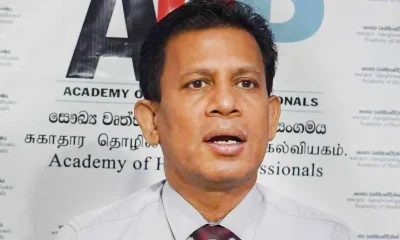
 News6 days ago
News6 days agoSuspension of Indian drug part of cover-up by NMRA: Academy of Health Professionals
-

 News7 days ago
News7 days agoCID probes unauthorised access to PNB’s vessel monitoring system


